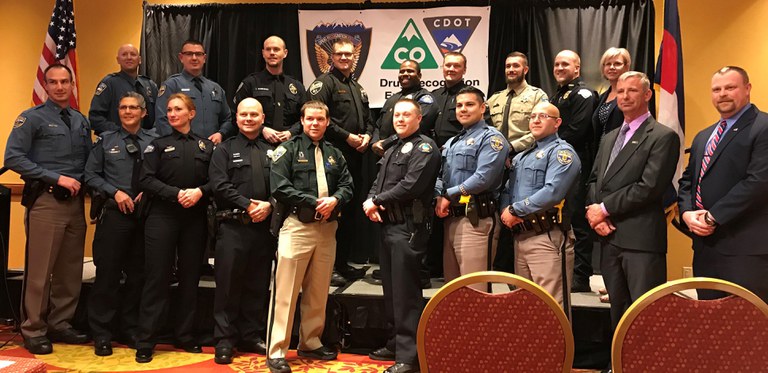CDOT Graduates 17 Officers and Troopers from Drug Recognition Program
STATEWIDE— Today 14 law enforcement agencies across Colorado gained additional capacity to identify and arrest drivers impaired by drugs. The Colorado Department of Transportation (CDOT) is graduating 17 new Drug Recognition Experts (DRE) from a training program hosted by the Loveland Police Department. The nine-day Drug Recognition Expert Training included officers from 14 police departments, sheriff offices, and state patrol troops throughout the state. The officers graduating from the program are:
- Officer Everett Williams, Aurora Police Department
- Officer Brandyn Rupp, Carbondale Police Department
- Officer John Parisi, Colorado Springs Police Department
- Trooper Nathan Tyree, Colorado State Patrol
- Trooper Daniel Weisel, Colorado State Patrol
- Trooper Jessie Baca, Colorado State Patrol
- Corporal Jeremy Simenson, CU Boulder Police Department
- Deputy Eric Dunston, Custer County Sheriff’s Office
- Officer Aaron Botts, Denver Police Department
- Corporal Brett Burrows, Garfield County Sheriff’s Office
- Officer Justin Garcia, Golden Police Department
- Trooper Bobby Gonzales, Colorado State Patrol
- Officer Nisse Ramser, Littleton Police Department
- Deputy Kyle Taylor, Logan County Sheriff’s Office
- Officer William Gates, Loveland Police Department
- Officer Kelli Litzau, Rifle Police Department
- Officer Beth Huber, Woodland Park Police Department
“The officers who are graduating today are to be commended for their commitment to traffic safety and making our roads safer from impaired drivers,” said Kim Ferber, DRE State Coordinator for CDOT. “With 30% of deaths on our roadways attributed to impaired drivers, drug recognition experts are critical to reducing that number and ultimately getting to our goal of zero deaths.”


The Colorado DRE program was founded in 1987 and is administered and funded by CDOT. The program trains peace officers to detect and articulate the signs, symptoms and indicia of drugs other than alcohol in subjects arrested for Driving Under the Influence (DUI) or other offenses. Colorado’s ending prohibition on marijuana makes the DRE a more valuable resource to an agency than ever before.
“This two-week program includes a series of tests and evaluations covering everything from drug categories to identifying subjects using drug combinations,” said International Association of Chiefs of Police DRE Technical Advisory Panel (TAP) Chair and Chief of Police Robert L. Ticer of Loveland Police Department. “These officers are now highly trained drug recognition experts, which will enhance the safety of our roadways across the state.”
There are currently 198 DREs in Colorado from 70 agencies. To become a Colorado DRE candidate, a Colorado peace officer must have support from the agency’s Chief or Sheriff to attend the entire training and successfully complete the approved Standardized Field Sobriety Testing (SFST) and the classroom format Advanced Roadside Impaired Driving Enforcement (ARIDE).
To heighten safety awareness, CDOT recently announced its Whole System Whole Safety initiative. This project takes a systematic statewide approach to safety combining the benefits of CDOT’s programs that address human factors, physical assets and organizational culture to better support real time operations. The goal is to improve the safety of Colorado’s transportation network by reducing the rate and severity of crashes and improving safety conditions for those traveling by all transportation modes. The program has one simple mission - to get everyone home safely.
About CDOT
CDOT has approximately 3,000 employees located throughout Colorado, and manages more than 23,000 lane miles of highway and 3,429 bridges. CDOT also manages grant partnerships with a range of other agencies, including metropolitan planning organizations, local governments and airports. It also administers Bustang, the state-owned and operated interregional express service. Gov. Jared Polis has charged CDOT to further build on the state’s intermodal mobility options.
